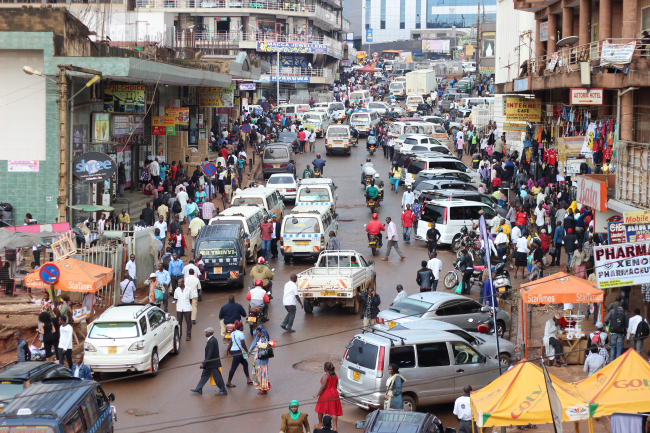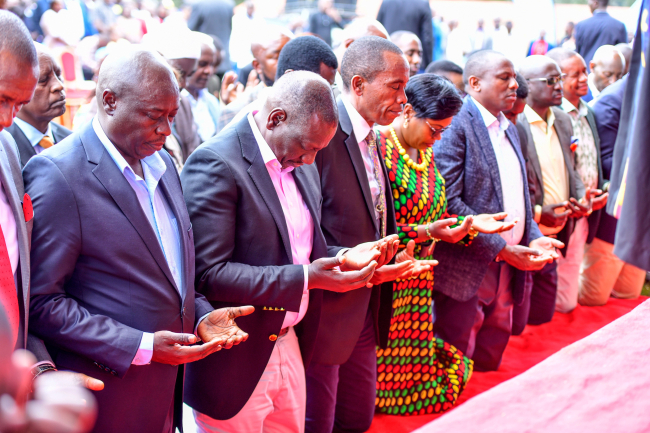Societies
The existence of an international civil society is the subject of theoretical debate. But beyond these debates, the study of societies remains essential to understanding how the world works.

City Diplomacy and Human Mobility in Africa. Protecting Refugees and Migrants along the Central Mediterranean Route from the East and the Horn of Africa
Cities face constraints to work on migration and refugee issues, often due to a lack of decentralisation and resource constraints. Adopting an inclusive city approach can safeguard local authorities’ commitment towards providing protection to residents regardless of status, while not overstepping legal mandates.
Kenya’s Spiritual President and The Making of a Born-Again Republic: William-Ruto, Kenya’s Evangelicals and Religious Mobilizations in African Electoral Politics
Over the last two decade, the growing influence of Evangelicals and their leaders in electoral politics is one of the most significant developments in the East African region and the Horn of Africa. Their numerical and demographic growth seems to go together with their growing influence in these countries’ political scenes, especially in the spheres of electoral politics, society, and governance.
Understanding Intermediate Cities in Nigeria: The Cases of Ibadan and Abeokuta
Nigeria is known for its rapid demographic and urban growth.
Neither Left nor Right, but Both? The Sahra Wagenknecht Alliance (BSW) in the Wake of European Elections
The 2024 European elections not only provided the occasion for a new German party, the “Bündnis Sahra Wagenknecht” (BSW), to emerge but also to obtain 6.2% of the vote.
Foreign Policy Issues in the BJP 2024 Election Campaign: Boosting National Pride and Glorifying a Strong Government
While election campaigns in India traditionally focus on domestic issues above all, the Bharatiya Janata Party’s (BJP) campaign for the 2024 general elections placed a strong emphasis on foreign policy. It emphasized how, under the leadership of Prime Minister Narendra Modi, India has strengthened its diplomatic role and achieved international economic success.
The New Russian Diaspora: Europe’s Challenge and Opportunity
This report assesses both the scale and the roots of the outward migration from the Russian Federation coinciding with Putin’s turning of Russia into an aggressive authoritarian state.

Populism and International Relations
Populism is flourishing, in Europe and elsewhere: a populist holds power today in Argentina and perhaps tomorrow in the United States. What does its spread say about our societies? And how is it shaping them, where populists rule? Do their economic policies stand any chance of success? Do their foreign policies have a greater impact on the world around them or at home? If “Trump 2.0” comes to be, will he have a free hand? If so, what can we expect?
What Is a Populist Foreign Policy?
It is difficult to identify a shared set of norms implemented by populist governments of all different political positions once in power.

AfD’s Foreign Policy Between Disengagement in the West and Partnership in the East
The Alternative for Germany (AfD) was formed in 2013 in the context of the currency crisis as an “alternative” to the Merkel government’s policy of rescuing the euro. Since then, the party’s platforms for the European elections in 2014, 2019 and 2024 have become increasingly radical.
The French Approach to Female Violent Extremist Offenders
How are women jihadists prosecuted and sentenced in different European countries? What happens when they are incarcerated? What reintegration programs are in place for women formerly detained for terrorism-related offenses?
Racial integration - Lessons from the U.S. Army
On Friday, the 13th of January, 2012, the Center for Migrations and Citizenship welcomed 3-star U.S. Army General Bostick as a speaker of its international conference: "Business and the State: Migration Policies, Diversity and Integration".
U.S. Demographics: The Hispanic Boom
As confirmed by the 2010 Census, Hispanics have become the largest and most dynamic ethnic minority in the United States. While still facing many difficulties, this rather diverse group is undergoing important changes in terms of political representation, economic situation and cultural recognition. It should play a growing role on the national scene in coming years.
The Politics of Amnesty in the Niger Delta : Challenges Ahead
Armed groups, many affiliated to the Niger Delta-wide political organisation MEND, the Movement for the Emancipation of the Niger Delta, proliferated throughout the oil producing states, particularly from early 2006 onwards. In January 2006, MEND declared war on the oil industry pending the resolution of long term political grievances relating to poverty and underdevelopment, the poor regulation of an environmentally polluting oil industry, and the alienation of local people from rights to land and resources in the Niger Delta.
‘‘I'm Not a Feminist, But…'', a Comparative Analysis of the Women's Movement in the United States and France
The emergence of a feminist thought in the 18th century gave rise to steady and regular exchanges between French philosophers and American activists. They illustrate in a very particular sector the wealth of the relation between both countries. This dialogue continues on renewed bases today: both in universities (with the exploration of the concept of gender) and in the militant world (with the defense of precise and limited causes).
Trafficking in the Sahel-Saharan Zone: Features and Stakes
On November 5th 2009, a cocaine-loaded Boeing 727 aircraft arriving from Venezuela was discovered torched and emptied on a makeshift airstrip in the Malian desert (Gao region). The Sahel-Saharan area is clearly a contact zone between very distant worlds.
Controlling Trafficking or Losing the North : Notes on Trafficking in Mauritania
Our interest in this topic stems both from our annual visits to Mauritania which started fifteen years ago, and the tiny amount of research noticed on trafficking in this country.
Arabs and Tuaregs in Colonial and Malian Armed Forces: A Story in Trompe-l'Oeil
This contribution consists in analyzing the unifying or opposing relations between the central State-power and the southern part of central-Saharan populations, mainly Arabs and Tuaregs, within the relational framework of colonial and Malian armed forces. The French Colonial State and the Malian independent State (from the 1960 independence movement) are both considered by Arabs and Tuaregs as external entities, whatever the form of their relation, good or bad.
Support independent French research
Ifri, a foundation recognized as being of public utility, relies largely on private donors – companies and individuals – to guarantee its sustainability and intellectual independence. Through their funding, donors help maintain the Institute's position among the world's leading think tanks. By benefiting from an internationally recognized network and expertise, donors refine their understanding of geopolitical risk and its consequences on global politics and the economy. In 2024, Ifri will support more than 70 French and foreign companies and organizations.














